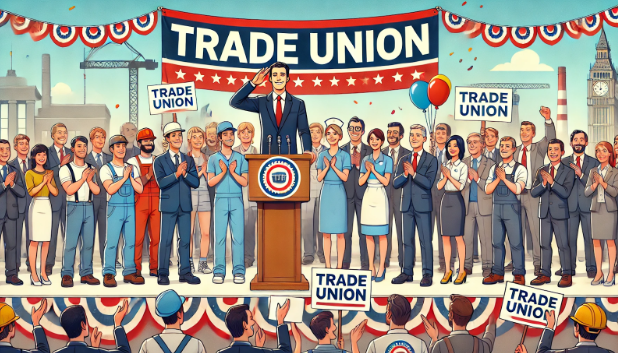News
Union Support Will Play A Big Role in the Elections. But Right Now, the Results Are Mixed

Over decades, union support played a critical role in determining the outcome of presidential elections. Trade unions have historically been pivotal in influencing election outcomes, especially in key swing states. Their endorsement often signals a candidate's commitment to labor issues and working-class voters. Traditionally, unions have supported Democratic candidates, believing they better represent labor interests. This backing has been crucial in swing states, where union votes can tip the scales.
However, recent developments are showing a shift in union support dynamics. Recently, a Teamsters Union president gave a speech at the Repubican National Convention and gave praise to several GOP officials. Short of an outright endorsement, this instance highlights a shift from the usual partisan support.
Many Unions Align with the Democratic Party
When President Joe Biden announced his decision to withdraw from seeking a second term, Vice President Kamala Harris immediately took up the slack. Among her first moves was to secure union support from national labor organizations. While she managed to get ringing endorsements from some, there were major players who remained undecided.
This early, Harris already secured union support from several major organizations. This includes The Service Employees International Union (SEIU), American Federation of Teachers (AFT), and Communications Workers of America (CWA). In addition, the AFL-CIO, the nation's largest labor federation, has also thrown its weight behind Harris, praising her as a “tenacious fighter for working people.” AFL-CIO President Liz Shuler emphasized the importance of continuing the pro-labor legacy of the Biden-Harris administration. Similarly, the United Steelworkers (USW) have expressed their support, highlighting Harris’s role in what they describe as the most pro-labor administration in recent history.
Why the Teamsters Seem to Support the GOP
Surprisingly, some of the country’s biggest unions have yet to show their hand. This includes the International Brotherhood of Teamsters and the United Auto Workers (UAW). The Teamsters, with their significant presence in swing states, have yet to declare their support for Harris. Their president, Sean O’Brien, attended the recent Republican National Convention and spoke to the crowd. Short of endorsing Trump, O’Briend instead praised the former president and Republican nominee and also gave thanks to Republican Senator Josh Hawley for supporting labor issues.
The recent Teamsters support for the GOP raised eyebrows, especially given their long history of aligning with the Democratic party. However, there are several reasons why O’Brien decided to show up at the RNC. First, the Teamsters recognized the support of several GOP figures who supported important labor issues. For example, Republican Senator Josh Hawley is an outspoken advocate for railroad workers, a critical sector for the Teamsters. Senator JD Vance, who is the Vice President nominee, is another friend to the Teamsters. His stance on airline manufacturing and independent contractor employment arrangements aligns with the union’s priorities.
Secondly, many Teamsters members hold conservative views. O’Brien and other union officials acknowledge this fact. By engaging with the GOP, they are showing that the union can accommodate a diverse political base. Finally, the Teamsters believe that getting both party’s attention can leverage their political influence more effectively. More importantly, it means that the union can get the support it needs no matter which party wins the election.
O’Brien’s attendance at the Republican National Convention may have marked a significant departure from traditional union behavior. However, his presence became a symbolic gesture that showed the union’s willingness to work with both parties instead of choosing one over the other.
Navigating the Future of Union Support
Union support remains a critical factor in the upcoming election, with its influence felt strongly in key swing states. While Vice President Harris has secured endorsements from major unions, the undecided stance of powerful unions like the Teamsters and UAW highlights the complexity of union politics. Historically aligned with the Democratic party, unions now exhibit a more nuanced relationship with political candidates, making their support a valuable but uncertain asset.
As the election approaches, both parties will continue to vie for union endorsements, recognizing their significant impact on the outcome. Union support, therefore, remains a key element in the strategy of any presidential campaign, shaping the political landscape in crucial ways.
Are you an advocate for labor unions? Do you believe that union support can make or break a candidate’s chances of winning an election? Tell us what you think.



